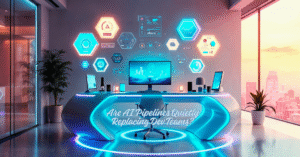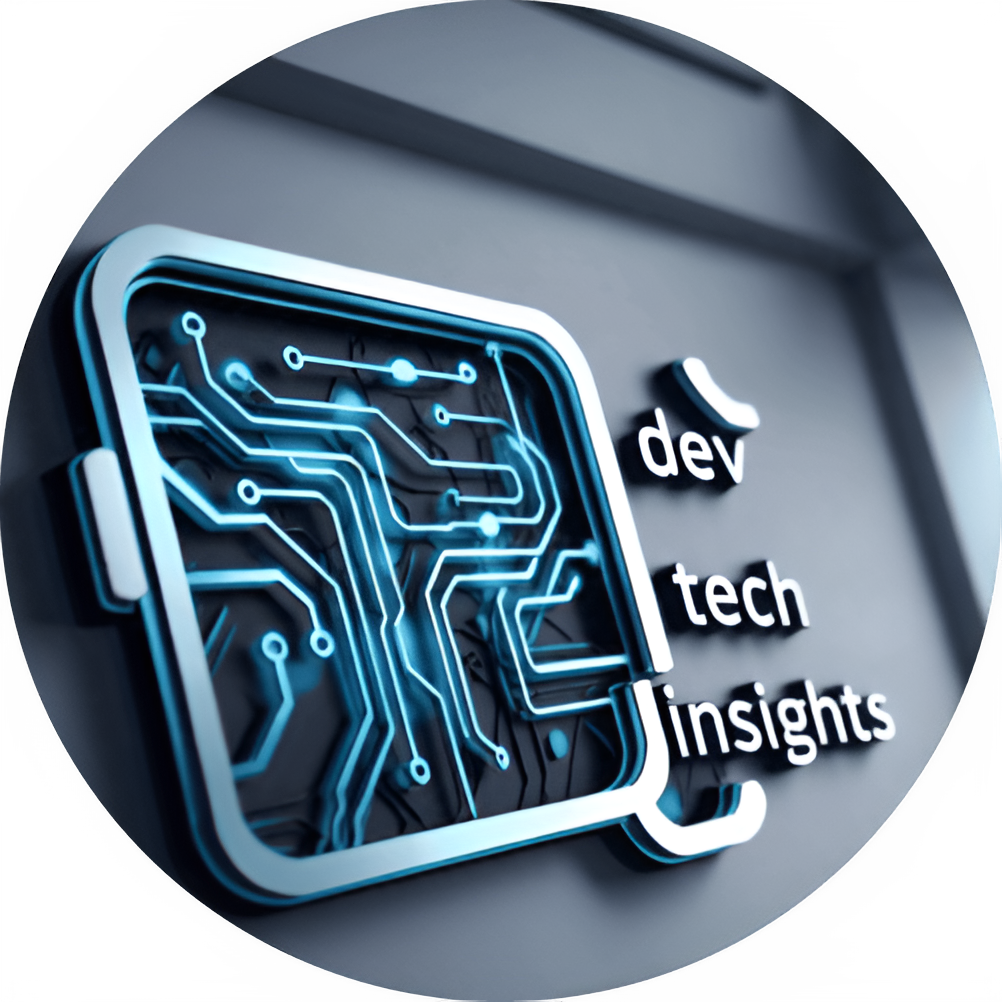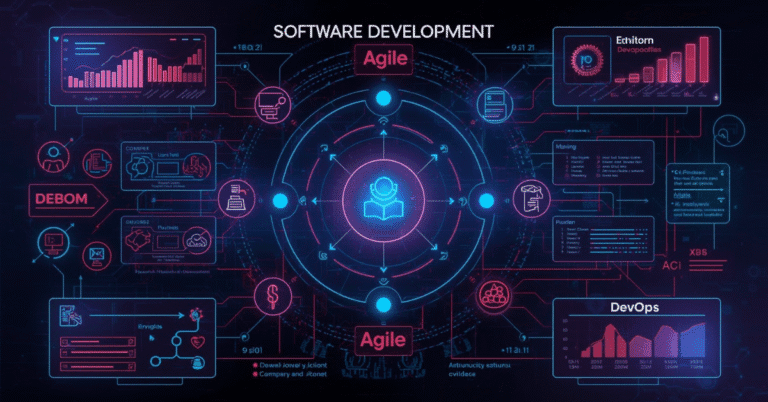
Software Development’s Third-Gen Revolution: Are Agentic AI Pipelines Replacing Dev Teams in 2025?
By Abdul Rehman Khan — Founder of Dev Tech Insights & Dark Tech Insights
Table of Contents
Introduction: A Silent Revolution Developers Didn’t See Coming
The year is 2025. Software development is undergoing its third great revolution — one that most developers didn’t expect to arrive this soon. The first revolution came with structured programming, the second with agile methodologies and DevOps. Now, the third is here: Agentic AI Pipelines.
These aren’t just coding assistants like GitHub Copilot or Tabnine. They are autonomous systems capable of planning, coding, testing, deploying, and iterating — all without human intervention.
For developers, this begs the chilling question:
Are we entering an era where entire dev teams are replaced by AI pipelines?
In this blog, we’ll explore how Agentic AI is reshaping software development, the hidden dangers nobody talks about, and why ignoring this revolution might leave you jobless by 2030.
The Rise of Agentic AI Pipelines
For years, AI coding assistants have been marketed as “helpers.” But in 2025, they’ve evolved into agents — capable of making decisions, not just suggestions.
Unlike Copilot, which waits for you to type a prompt, Agentic AI Pipelines can:
- Gather requirements from a document or conversation
- Break down tasks into microservices
- Generate backend & frontend code automatically
- Deploy apps in real-time using integrated DevOps
- Run automated QA tests and fix issues without human input
- Optimize performance continuously with live feedback loops
In other words: what used to take a 10-person team weeks to build can now be done in hours with a single AI pipeline.
The Corporate Adoption Curve
Big players like Microsoft, Google, and Amazon are already embedding Agentic AI into their cloud ecosystems. Startups are rushing to use open-source frameworks like AutoDev, CrewAI, and LangGraph.
By Q4 of 2025, analysts predict 40% of new SaaS startups will rely on Agentic AI pipelines instead of full dev teams.
Why Companies Love Agentic AI (And Why Developers Should Worry)
From a corporate lens, Agentic AI is a dream:
- Lower Costs: One AI pipeline ≈ replacing 5–10 developers.
- Faster Time-to-Market: Release cycles shrink from months to days.
- Error Reduction: AI pipelines iterate instantly based on logs & feedback.
- 24/7 Productivity: No sick leaves, no burnout.
But for developers, this spells trouble. Companies no longer need as many coders. In fact, many mid-level developer roles are being quietly phased out.
The developer shortage of the 2020s is turning into a developer surplus — thanks to AI.
The Human Element AI Still Can’t Replace
Before you panic, here’s the good news: AI pipelines still can’t fully replicate human creativity, ethical judgment, and strategic thinking.
Humans remain essential in areas like:
- Architecture Design: AI is great at execution but still lacks long-term vision.
- Ethics & Security Oversight: Ensuring AI-built apps don’t cross ethical boundaries.
- Critical Innovation: Truly novel solutions still emerge from human ingenuity.
- Complex Stakeholder Communication: AI struggles with nuanced human interactions.
So, while junior developers face the brunt, senior devs, architects, and AI overseers are in high demand.
Case Study: When Agentic AI Outperformed a Dev Team in Tokyo
Earlier this year, a Tokyo-based fintech startup ran a bold experiment. They assigned one project to a 7-person human dev team and another to an Agentic AI pipeline.
The results shocked everyone:
- The AI pipeline delivered the MVP in 48 hours, compared to 3 weeks for the human team.
- The cost savings were 82% lower.
- Performance benchmarks favored the AI-built solution.
The startup announced they would reduce 60% of their developer workforce by 2026.
This isn’t science fiction. It’s happening right now.
Useful Links
- Is Bun Ready to Replace Node.js in Production? A 2025 Developer’s Take
- Software Development Life Cycle (SDLC) in 2025: Stages, Models, and Modern Practices
- The Rise of Composable Software: Why Developers Need to Think Modular in 2025
- Toil is Back: Why Even with AI, SREs Feel the Burn in 2025
- Best Python Libraries for Automation Developers Overlook in 2025
- Functional Programming in 2025: Are Pure Functions Making a Comeback?
The Hidden Dangers Nobody Talks About
While the hype is real, there are dark truths hidden under the shine of Agentic AI.
1. Algorithmic Lock-In
Most Agentic AI pipelines rely on proprietary models. If a corporation controls your AI pipeline, they control your workflow, updates, and even innovation pace.
2. Security Nightmare
An autonomous pipeline with access to production environments becomes the ultimate attack surface. If hacked, it could self-replicate and deploy malicious code across systems.
3. The Creativity Collapse
AI excels at patterns but struggles with genuine creativity. Over-reliance may lead to a future where apps look and feel the same.
4. The Disappearance of Junior Roles
Without entry-level jobs, how will future developers gain the experience to become seniors? Agentic AI risks collapsing the very career ladder of tech.
What Developers Can Do to Survive
If you’re reading this, don’t despair. You still have options — but they require proactive adaptation.
🔑 1. Learn to Manage AI, Not Compete With It
Master tools like LangGraph, CrewAI, and AutoDev. Position yourself as an AI overseer rather than a rival.
🔑 2. Focus on Security and Ethics
Cybersecurity and AI ethics are skyrocketing in demand. These are roles AI can’t take over easily.
🔑 3. Build Cross-Disciplinary Skills
Combine programming with business acumen, UX research, or data science to stay relevant.
🔑 4. Create Personal IP and Side Projects
With low-code AI tools, indie devs can now build SaaS startups without investors or big teams.
Conclusion: The Third-Gen Revolution Is Here
Agentic AI pipelines are not “coming soon.” They’re already here — quietly rewriting the rules of software development in 2025.
Developers who adapt will find new opportunities as AI managers, security overseers, and innovation leaders. Those who ignore it may watch their careers fade by the next decade.
The question is no longer “Will AI replace us?” — it’s “How will we survive the revolution?”
Author Box
Written by Abdul Rehman Khan
Founder of Dev Tech Insights and Dark Tech Insights
A programmer and blogger with 2 years of experience helping developers navigate the intersection of AI, SEO, and future tech trends.
Q1. What exactly are Agentic AI Pipelines?
Agentic AI Pipelines are autonomous systems that can handle the full software lifecycle — from gathering requirements and writing code to testing, deploying, and maintaining applications — without direct human involvement.
Q2. Will Agentic AI completely replace software developers?
Not entirely. While Agentic AI can replace many junior and mid-level roles, human developers are still essential for tasks involving creativity, ethics, architecture planning, and stakeholder communication.
Q3. How soon will companies start adopting Agentic AI pipelines?
Many organizations have already started. By the end of 2025, it’s predicted that up to 40% of new startups will rely heavily on Agentic AI pipelines instead of hiring full dev teams.
Q4. What skills should developers learn to stay relevant in this AI-driven era?
Developers should focus on AI oversight, cybersecurity, ethics, and cross-disciplinary skills such as business strategy and UX design. Learning to manage and audit AI pipelines will be critical.
Q5. Are there risks in using Agentic AI for software development?
Yes. Key risks include algorithmic lock-in, cybersecurity vulnerabilities, loss of creativity, and the collapse of junior-level roles, which may threaten the long-term sustainability of the tech industry.

🚀 Let's Build Something Amazing Together
Hi, I'm Abdul Rehman Khan, founder of Dev Tech Insights & Dark Tech Insights. I specialize in turning ideas into fast, scalable, and modern web solutions. From startups to enterprises, I've helped teams launch products that grow.
- ⚡ Frontend Development (HTML, CSS, JavaScript)
- 📱 MVP Development (from idea to launch)
- 📱 Mobile & Web Apps (React, Next.js, Node.js)
- 📊 Streamlit Dashboards & AI Tools
- 🔍 SEO & Web Performance Optimization
- 🛠️ Custom WordPress & Plugin Development




